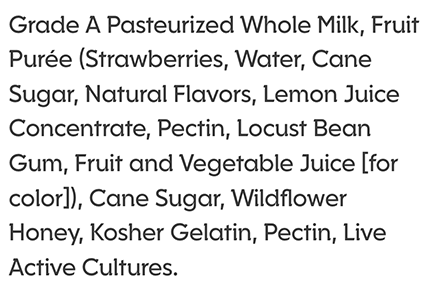
Noosa Yogurt is a popular Australian yogurt brand that’s available both in-store and online in the US. The company makes yogurt from whole milk, and describes their product line as “Full On Tasty.”
But what ingredients are actually in Noosa Yogurt beyond milk, and is it healthy? Are there any questionable additives? Is whole milk healthier than skim milk? And can yogurt support weight loss?
In this article we’ll answer all of these questions and more, as we analyze the ingredients in Noosa Yogurt to give our take on whether or not the brand is healthy.
We’ll share our thoughts on whole milk versus skim milk, and share a video that analyzes whether or not yogurt can cause weight loss.
Key takeaways:
- Unclear if sourced from conventionally-raised animals
- Contains flavoring ingredients we consider unhealthy
- We consider Noosa Yogurt to be moderately healthy (but there are better options)
Ingredient Analysis
The ingredients in Noosa Strawberry Yoghurt are shown below:

Whole milk is the first-listed ingredient, and we like the use of whole milk over skim milk.
The popular notion that dietary fat causes obesity is misguided. Consuming excess calories over baseline causes obesity regardless of the calorie source.
A 2018 clinical trial found that whole milk consumption did not have worse effects on cholesterol, glucose or insulin in otherwise healthy adults, and whole milk is nutritionally richer than skim milk because the fat contains omega-3 and omega-6 fatty acids.
However, there is no mention on Noosa’s website about whether their milk is sourced from grass-fed or conventionally-raised animals.
As we documented in our Fairlife Protein Shake reviews article, milk from grass-fed animals has been shown to be richer in omega-3 fatty acids than milk from conventionally-raised animals, and grass-fed milk tends to be higher in conjugated linoleic acid (CLA), which can have cardiovascular benefits.
Cane sugar is listed twice on the ingredient list, with 18 grams (g) of added sugar in this flavor, which equals 36% of the Daily Value (DV).
Added sugar in excess can cause inflammation in the body according to a medical review published in the Frontiers in Immunology journal, and many Americans already consume too much added sugar from their diet.
Natural flavors is listed as an ingredient, and we recommend that consumers be wary of natural flavors for reasons described in a 2017 medical review:
"In reality, ‘natural flavors’ are a far cry from what consumers might expect, as they can contain both artificial and synthetic chemicals (often used as processing aids).”
Live and active cultures refers to beneficial bacterial strains, and this ingredient is one of the reasons that yogurt is considered to be healthy.
A medical review published in the Foods journal found that yogurt consumption can reduce risk of cardiovascular disease and diabetes, and promote gut health.
Overall, we consider Noosa Yogurt to be somewhat healthy. The benefits likely outweigh the drawbacks given the considerable research backing for probiotics, but we don’t currently recommend this yogurt brand.
We would prefer a yogurt brand that sourced milk from grass-fed animals and uses only fruits to sweeten the yogurt, instead of refined sugar.
Can Yogurt Cause Weight Loss?
A YouTube video from a channel called "motivationaldoc" cites research studies to discuss whether or not yogurt consumption can cause weight loss:




























































